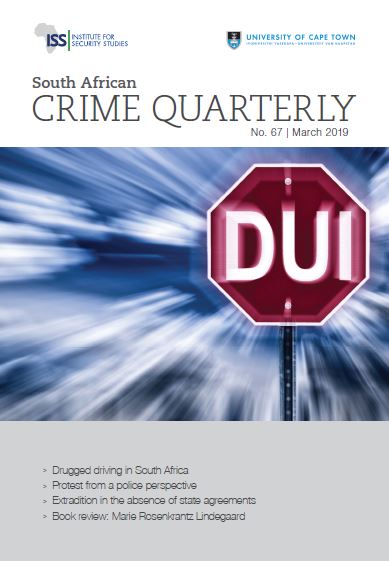No. 67 (2019): March 2019

Jade Liebenberg, Lorraine du Toit-Prinsloo, Gert Saayman and Vanessa Steenkamp address the admissibility of these kinds of tests in their article entitled Drugged driving in South Africa: An urgent need for review and reform. The authors highlight that while it is common practice in South Africa to test drivers for alcohol levels, testing for additional substances (like drugs of abuse) is rarely performed. Current legislation only prohibits driving under the influence of alcohol and a ‘drug having a “narcotic” effect’ which excludes several impairing psychoactive drugs which are not classified as narcotic substances. The authors discuss issues and/or limitations that affect the detection of drugged driving and propose revisions of the National Road Traffic Act to include a comprehensive statutory definition and detailed provisions for drug testing to deter impaired driving.
The policing of protest has been a regular feature on the pages of South African Crime Quarterly since our December 2017 special edition. Heidi Brooks adds to this conversation by providing an account of an often-silent constituency: the police who are tasked with the dual obligation of ensuring the safety and security of communities on the one hand, and protecting democratic rights and freedoms on the other. Brooks examines protest from the perspective of rank and file officers in the South African Police Service (SAPS) and shows not only the importance of recognising bottom-up perspectives in constructing appropriate responses to protest, but the complexity of SAPS members’ own identities as both officers and citizens. She shows how, for many officers, protest seems to straddle their police and private lives, conferring on them a duty to enforce law and order, while experiencing the shortcomings of democracy themselves.
Crystal Mokoena and Emma Lubaale discuss extradition where states do not have extradition treaties with one another. State sovereignty dictates that states exercise authority over all persons and things within their territories, including people who are suspected of committing or charged with crimes in foreign states. International law generally imposes no obligation to surrender individuals suspected of or charged with committing crimes in foreign states and as such, states are increasingly ratifying international treaties mandating cooperation to ensure that individuals responsible for certain categories of crimes are brought to justice. Mokoena and Lubaale discuss whether, in cases where there are no treaties to provide for extradition, states can rely on the United Nations Convention Against Corruption (UNCAC) to extradite individuals for corruption-related crimes.
Irvin Kinnes reviews Marie Rosenkrantz Lindegaard’s book Surviving gangs, violence and racism in Cape Town: Ghetto Chameleons published by Abingdon: Routledge Advances in Ethnography in 2017. Kinnes concludes that Ghetto Chameleons provides its reader with a new way of seeing and understanding the current gang discourse by showing how young men in gangs on the Cape Flats do, how they associate, and how they use mobility to move and change their cultural repertoires in gang and suburban spaces. A deep dive longitudinal ethnography undertaken with 47 young men, the book shows us that gangsters are much more than just gangsters: not homogeneous, mobile, and with perspectives about themselves that they use flexibly, depending on their environment. Kinnes concludes that the book is required reading for any scholar of crime and mobility, and for those interested in exploring the links between gangs, cultural repertoires and mobility.


.png)